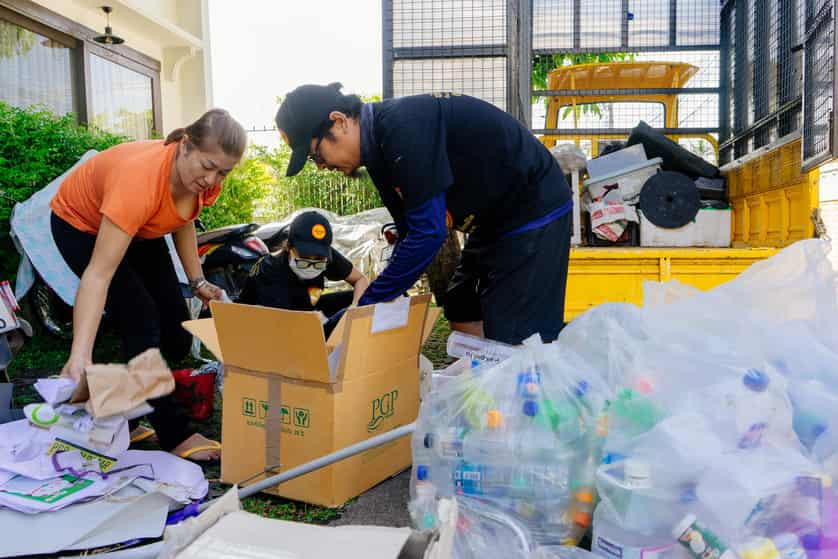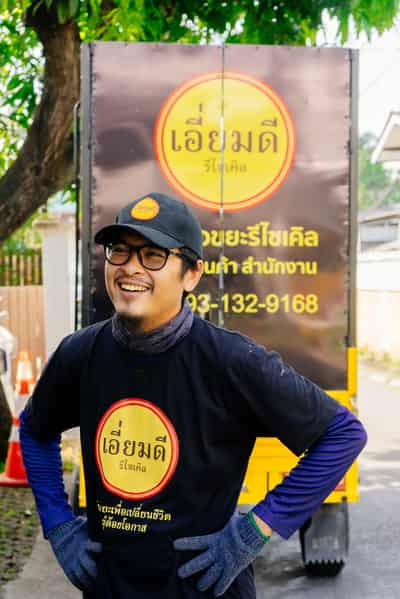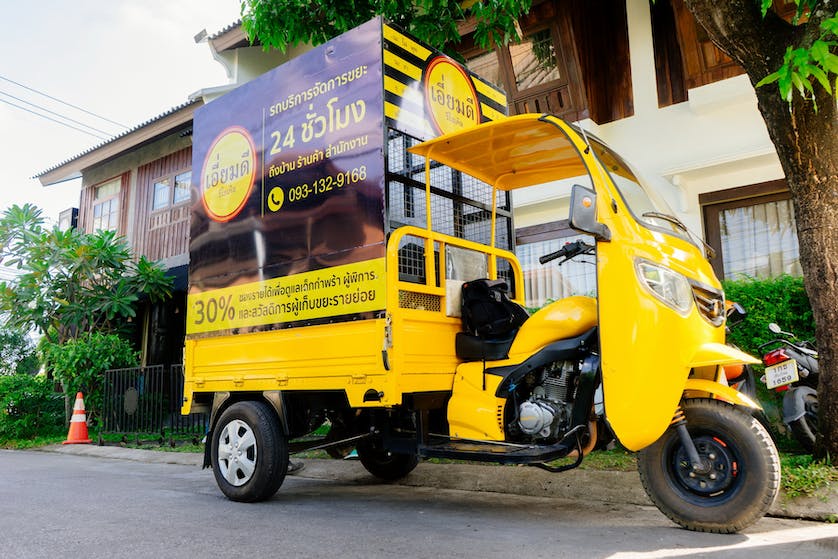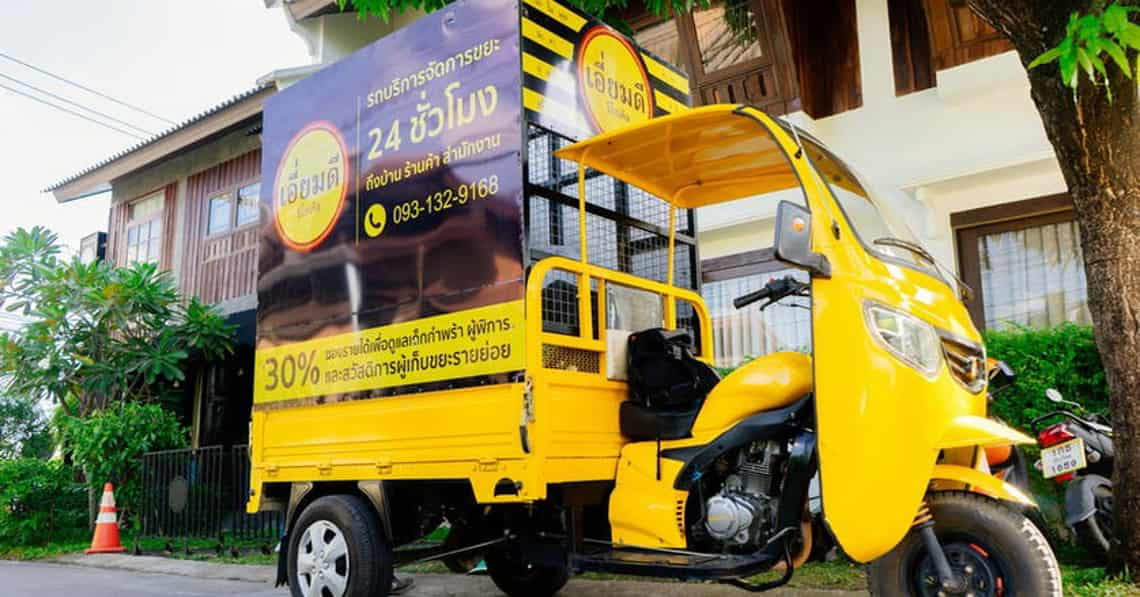“Recycling has potential. It is an industry which can grow sustainably if the benefits are shared amongst all the people in the system,” said Sampan ‘Dome’ Nenrod, the founder of Eiamdee Recycle. His emerging and ambitious business has big plans to elevate Chiang Mai’s household waste management. Dome was a teacher for many years before making a shift into becoming a documentary filmmaker and a producer at TV Burabha. “I worked there for 14 years and at the peak of my career, I reached the point where I felt an urgency to seek out new challenges,” said Dome who succeeded in establishing a media and production house which gained recognition nationwide. “I knew that I wanted to do something about the environment and the suffering of city people, but I wasn’t quite sure what…until I got a chance to work on a documentary about waste management.”

Over the past few years, Dome slowly withdrew from his job as TV producer, building up a team to continue his work, and slowly phasing out into freelance work so that he could spend more time on research for his recycling business. “How does the system work? That was what I tried to understand so I spent about a year studying the sa laeng group [the people you see going from garbage bin to garbage bin, often with a motorcycle and side car, separating our garbage]. I slept with them at Tha Pae Gate. I went on collection tasks with them. These people are at risk every day of getting hit by cars and scrambling with trash in dark places, not to mention potential risks to their health. They have nothing to guarantee their safety, let alone their livelihood. We look down on them while they are the ones who sort out our garbage at the front lines of recycling.”

His vision has expanded into supporting their children with school supplies and creating jobs for people with disabilities. Dome says that as he goes out each day collecting people’s waste and talking to them, they often give him old computer monitors or TVs, all of which are appreciated by many orphanages or schools. “I went to collect recycled goods at Thao Bun Rueang School and found that they were short on supplies, then I noticed that many people are throwing away things which are still useful, so I put the two together, making connections and giving new life to waste. If I see that something can be reused or fixed, I will do it, and then pass it on to those in need. If I see a book which isn’t in terrible condition then I give it to a library. There are also a lot of good quality clothes that people don’t use anymore and I am trying to make a deal with a laundry shop to clean them before donating them to orphanages. I am also working with an electrical shop and hope that they will offer to provide repairing services to our network.” Dome’s house is currently being renovated to provide a work space for the disabled.
On the first day of Eiamdee Recycle this past May, Dome received 28 baht. Now his daily income is averaging around a thousand baht. “I need to make quite a lot of adjustments from having a hundred thousand baht salary dwindled down to the current revenue,” said Dome explaining that no one supported him when he announced his intention to make such a drastic career change except for his partner. “I had to personally show my mum how this idea of mine was going to work,” Dome explained his frustration at people’s general perception that garbage should all be thrown away and that it was dirty business. Where others see waste, he sees opportunity. With proper management Dome believes that his little business has potential to grow. “The benefits need to be shared with all stakeholders, which is how Eiamdee can grow into a sustainable social enterprise.”

Citylife visited a boutique hotel with Eiamdee one early morning and watched Dome as he politely suggested to the staff that transparent water bottles could be sold for two baht per kilo, while milk plastic bottles could be sold for twice that amount. Spray cans cannot be recycled, Dome explained, but he collected them anyway. “If we leave them behind people won’t know how to take care of them, so we try to take all the garbage the customers give us, as much as we can anyway. Things that cannot be recycled like hazardous waste, I will personally deliver to the municipality where they can dispose of it,” said Dome adding that Eiamdee is still unable to take furniture and other large items.
“It is hard work,” said Dome, comparing the task to construction work except for the fact that he can choose when to rest, “what I didn’t calculate into the business plan was physical exhaustion.” It’s been only five months and Eiamdee is still a one man business. Now that Eiamdee has gained some recognition, side jobs like participating in various talks and discussion panels means that he has less time on collection duty. He admits that at the time of this interview there have been customers waiting in line for as long as a month. “By myself, I can only do so much and I understand that people cannot wait so long as garbage will pile up.” According to Dome, Eiamdee has opened a call for volunteers with many people interested but when it comes to the real hard work, they don’t stay long. “I will take the volunteer on duty with me for a week for them to learn about separation, prices, designing the route and logistics knowledge,” Dome said, admitting that it is hard work and needs strong passion.
“The most important thing is we share the benefit. It’s not about making profits but people can actually learn about waste management. When people know that their garbage can be sold as well as actually help people, this becomes interesting. There is intangible benefit that has more value than just money. Eiamdee will grow sustainably with benefit shared to all people involved as well as with the whole community,” said Dome.
For those who wish to get in touch please call 093 132 9168 or visit Facebook: เอี่ยมดี
